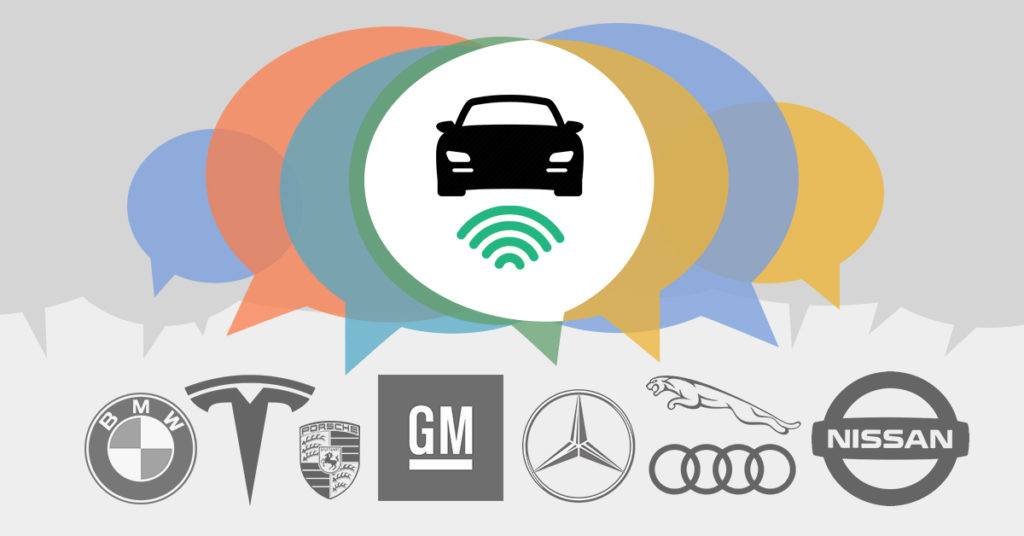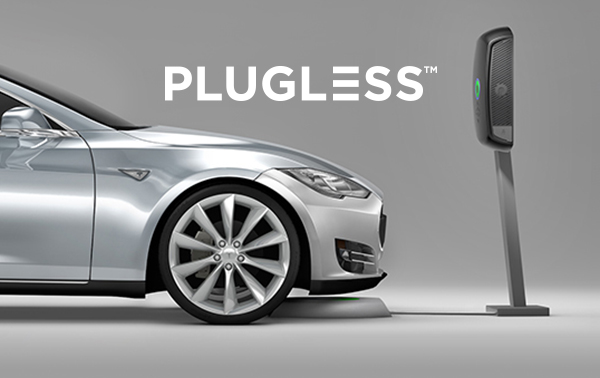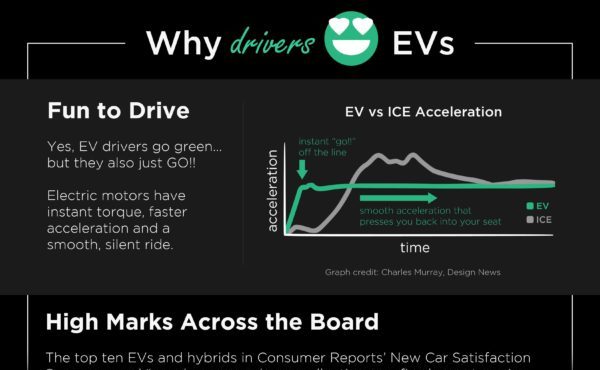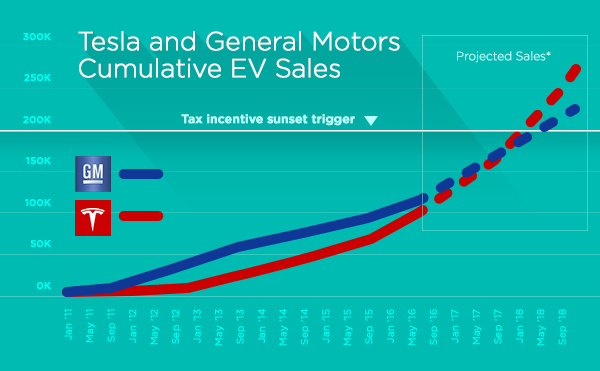Mainstream Electric Car Makers Race to Wireless EV Charging
Wireless Charging Upgrade for Tesla
Learn More
by Mia Yamauchi

Nearly every electric car maker has plans for hands-free EV charging — everything from electrified ultrasedans from Mercedes to the Nissan LEAF.
Luxury EV Makers Ramp Up Wireless Charging Announcements
Wireless charging is an easy sell for the luxury car market: more convenient, more futuristic, more awesome. Autonomous inductive charging simultaneously hearkens back to the luxury of the full service gas station attendant and fulfills the promise of futuristic, clean, autonomous transportation systems.
Wireless charging has been in the spotlight at this year’s Paris Motor Show, with VW and Mercedes-Benz featuring inductive charging in their marquee EV announcements. Both hinted at late-decade production vehicles. For Mercedes this is a doubling down on wireless charging, having recently announced it wireless charging on the 2017 S550e. Buyers will be able to opt for built-in wireless charging when they special order this $97,000 base-price plugin hybrid to keep the sedan’s 19 miles of battery-only range topped off. The idea of a luxury car so convenient it even fuels itself is a perfect fit with the high-end Benz brand.
BMW has previously demonstrated wireless charging with the i8 the company uses as a pace car in Formula E racing. Rumors abound regarding wireless charging systems for BMW i-series plug in hybrid electric vehicles. In a post on the BMW blog last year, the automaker talked up wireless charging as a way to ensure “optimal range for zero-tailpipe-emission electric driving.”
Plugless is the only company offering wireless charging for many of the EVs on the road today. The Plugless system is a premium accessory available on four EVs, covering nearly half the North American EV market and making a wireless charging available today for more than a quarter million EV drivers in the US alone.
A unique autonomous charging concept in the luxury market comes from Tesla Motors. Tesla’s robotic “snake charger” prototype physically finds and connects itself to the car’s charging port. Some (even at Tesla) have expressed doubts about the contraption. Even if consumers can get past the slithering aesthetic, every vertebrate knows firsthand how one tiny tweak can disable a system with so many articulating joints and pieces. Most electric vehicle drivers value low maintenance tech with fewer moving parts. And Tesla owners may have to wait a long time as Elon Musk said in January, “we’d probably roll it out first on some of the Super Chargers and see how that goes.”
For the snake-averse in the ultrasedan market, the Plugless Model S is available today for wireless inductive charging at home. Support for the Model X and upcoming Model 3 are expected as well.
Audi has been vocal about the imperative to “hurry” towards inductive charging as a top executive explained late last year.
A refueling solution that works indoors and outdoors in even the tightest parking spots, whether you remember it or not, makes refueling with an electric car more convenient than with a gas car.
Not to be left behind in the race to self-charging EVs, Porsche’s Mission E announcements include wireless charging. Porsche has made it clear that it will only release a pure EV when it feels it can deliver an electric car that truly embodies the values of the luxury brand. In an interview with the LA Times, Wolgang Hatz, Porsche Global Head of R&D, said of Porsche’s EV strategy:
Optimal charging plays a key role in Porsche’s concept of the perfect EV. Porsche claims its e-sports car’s 310 mile battery will charge up to 80% full in just 15 minutes, making road trips a breeze. For daily home charging needs the Mission E offers the convenience of an inductive charging system. Porsche is targeting 2020 for delivery of the Mission E.
Nissan’s Future Vision of Wireless EV Charging
According to its Future Technology website, Nissan’s wireless charging feature “frees an electric vehicle (EV) of the need for a cable when charging, further advancing the convenience of EVs.” Nissan highlights the potential of self-charging vehicles in its Smart Street video released this March. In Nissan’s Utopian vision, autonomous electric vehicles, wireless charging and flexible grids all work together to ensure that “no renewable energy goes to waste” in clean, beautiful, interconnected cities.
Nissan’s Intelligent Driving System (IDS) concept car boasts over 200 miles pure electric range, autonomous parking capabilities and wireless charging. Nissan’s goal is to deliver electric vehicles that “equal or surpass the convenience of gas cars.” Concept car features don’t all end up in production vehicles (and Nissan has not promised a timeline) but the design suggests a strategy focusing on bringing the best of EV tech to the more affordable, longer-range EV segment.
There is already an wireless charging accessory option for the 98,810 Americans who have purchased a Nissan LEAF. The LEAF was the first vehicle Plugless supported because it was the most popular battery electric vehicle on the market when we started production.
Wireless EV Charging and Chevy
There is very little news from Chevy on adding wireless EV charging to its lineup. Although, they do offer a wireless phone charging option in the center console. Plugless has offered wireless charging for the Chevy Volt since early 2014. And we will likely support Bolt wireless charging as well.
Some argue wireless charging is less valuable for the Chevy Volt since it runs on gas if you don’t plug in. As a Volt driver I disagree. Even though forgetting to charge isn’t critical, it’s annoying. Plugin hybrid drivers can get addicted to the e-mile lifestyle and resent obligatory gas station visits. They have also paid a premium for their electrified drive train. A system that lets a plugin hybrid charge itself helps maximize electric miles over the car’s lifetime.
 The Path to Widespread Wireless EV Charging
The Path to Widespread Wireless EV Charging
Interoperability will be the next major stepping stone to widespread adoption of wireless EV charging.
Research and industry leaders, including Evatran, the maker of the Plugless accessory, are contributing to the conversations around developing a wireless charging standard. A draft wireless charging standard (J2954) has been released by standards organization SAE. As the standard develops over the next 3-5 years it may help pave the way for broader interoperability. In the same way that standardized home outlets can power any consumer appliance, standardized wireless charging protocols have the potential to make wireless charging an easy way to charge any electric vehicle.
While the standards develop, Plugless has begun the release of its second generation Plugless system this fall. The second generation Plugless, already available on the Model S, improves interoperability between the EV models that Plugless will support using the platform. The 2nd Gen Plugless system is an important step towards our goal of supporting wireless charging for 80% of electric vehicles on the road in North America.
It is our vision that one day in the near future, EV drivers can pull up to any Plugless-enabled space for home, workplace or public charging. For example, a wireless charging space at the grocery store where their battery tops off while they shop. No hassling with dirty cords in poor weather conditions—simply park and go.
Why so much news about wireless EV charging?
From luxury electric sedans to everyday commuter cars, the discussion about wireless charging is popping up everywhere. Industry and customers agree that the hassle of cords is one of the barriers slowing EV adoption.
Wireless charging helps electric vehicles surpass the convenience of gas cars. Even the most far-out ideas around wireless charging may become reality sooner than most expect.




